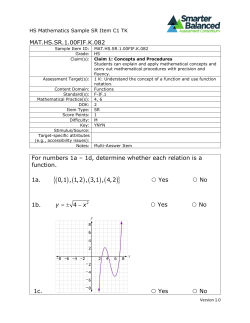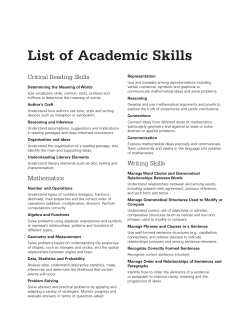
Job Opportunities - University of Cambridge
University of Cambridge Department of Applied Mathematics and Theoretical Physics University Lectureship (0.5 FTE) in Quantum Information Theory Applications are invited for a University Lectureship in the Mathematics of Information to be held in the Department of Applied Mathematics and Theoretical Physics (DAMTP). Candidates should hold a PhD or equivalent in mathematics or a closely related subject, and have an outstanding record of research in the mathematical techniques of quantum information theory, especially quantum entropy and its application to channel capacities and quantum statistical inference. The Position University Lecturer is one of four grades of academic post at the University of Cambridge, the others being Senior Lecturer, Reader and Professor. Rapid promotion through the grades is possible for candidates whose achievements merit this. A University Lectureship in Cambridge is roughly equivalent to an Associate Professorship in the US. The person appointed will be required to contribute to teaching, examining and administration and to research, including the supervision of graduate students and generation of research funding. So far as formal lecturing is concerned, the average full-time load in DAMTP is some 40 hours per year, typically one undergraduate course and one graduate-level course. As this is a half-time position, the teaching load will be reduced accordingly. There is a normal sabbatical entitlement of one term in seven on full pay, subject to University regulations. The Department The Department of Applied Mathematics and Theoretical Physics is one of the largest and strongest departments of its kind in Europe. The Department currently consists of 26 Professors (9 of whom are FRS), 11 Readers, 1 Senior Lecturer and 11 Lecturers, approximately 80 Post-doctoral Fellows and approximately 110 Research Students. Over 800 undergraduate and postgraduate students are enrolled in Parts I to III (years 1 to 4) of the Mathematical Tripos. Part III is not only the 4th year of the undergraduate course, but attracts more than 100 students each year from outside Cambridge, who take it as a oneyear postgraduate course, leading to a Masters degree. DAMTP shares responsibility for teaching in the Mathematical Tripos with its sister Department, the Department of Pure Mathematics and Mathematical Statistics (DPMMS). DAMTP also has responsibility for teaching mathematics to undergraduates taking Natural Sciences. DAMTP and DPMMS are accommodated, along with the Isaac Newton Institute for Mathematical Sciences and the Betty and Gordon Moore Library (covering mathematics, physical sciences and technology) at the Centre for Mathematical Sciences, a purpose-built complex in Wilberforce Road. Research in DAMTP Current research in DAMTP is loosely organised into eight broad subject areas: Applied and Computational Analysis, Astrophysics, Geophysics, Fluid and Solid Mechanics, Mathematical Biology, Quantum Information, High Energy Physics and General Relativity and Cosmology. The boundaries between the areas are not rigid and evolve with time. Many members of staff contribute to more than one area and this is regarded as a key factor in the continuing success of DAMTP. Research in each of DAMTP’s subject areas involves collaboration with strong groups nationally and internationally, and participation in numerous interdisciplinary projects and programmes. Many members of DAMTP have valuable links with industry and other nonacademic sectors. For more information please see: http://www.damtp.cam.ac.uk/research. The Department has a large amount of computing power, consisting mainly of a sophisticated heterogeneous network of UNIX workstations and Linux PCs, but also incorporating some Windows and Macintosh systems. At University level there is largerscale provision via the University High Performance Computing Service (http://www.hpc.cam.ac.uk/). Alongside DAMTP itself this hosts important parts of the STFC-funded DiRAC-2 facility. There are strong links with the Isaac Newton Institute for Mathematical Sciences. At any time the Institute runs two parallel research programmes, each usually lasting six months and attracting several dozen mathematical scientists nationally and internationally. In several areas there are also links to research in DPMMS https://www.dpmms.cam.ac.uk/, the Cambridge BP Institute http://www.bpi.cam.ac.uk/ and other Departments within the School of Physical Sciences http://www.physsci.cam.ac.uk/researchinsps. Further general information about the University of Cambridge, the Department of Applied Mathematics and Theoretical Physics, and Mathematics in Cambridge may be found on the websites: http://www.cam.ac.uk, http://www.damtp.cam.ac.uk and http://www.maths.cam.ac.uk. As part of the Faculty of Mathematics DAMTP is a supporter of the Good Practice Scheme developed by the London Mathematical Society’s Women in Mathematics Committee. (http://www.lms.ac.uk/women/good-practice-scheme). The Faculty has recently successfully applied for an Athena SWAN Bronze Award. The Department would particularly welcome applications from women, since women are, and have historically been, underrepresented on our academic staff. Applications The closing date for applications is 17 August 2016. It is expected that shortlisted candidates will be invited to visit the Department for interview during September 2016. To submit an application for this vacancy, please click on the 'Apply online' button of the advert published on the University of Cambridge's Job Opportunities pages at http://www.jobs.cam.ac.uk/job/10790. This will route you to the University's Web Recruitment System, where you will need to register an account (if you have not already) and log in before completing the online application form. With your application, please upload a full curriculum vitae, list of publications, research and teaching statements and also indicate the contact details of three academic referees and ensure that they are aware that they will be contacted by the Mathematics HR Office Administrator to request that they upload a reference for you to our Web Recruitment System, and please encourage them to respond promptly. Terms and Conditions of Employment General Information General information about employment at the University of Cambridge is available at: http://www.jobs.cam.ac.uk/ Period of Appointment Appointment will be made at an appropriate point on the scale for University Lecturers and will normally be for a probationary period of five years with appointment to the retiring age thereafter, subject to satisfactory performance. USS University Lecturers are eligible to join the nationwide superannuation scheme for academic and academic-related staff, the University’s Superannuation Scheme (USS). Salary The full-time salary scale for a University Lecturer is £38,511 a year, rising to £48,743 a year pro rata. The equivalent annual salary for this 0.5 position will therefore be £19,255.50, rising to £24,371.50. The starting point on the scale will depend on previous experience. Removal Expenses If the person appointed is not resident in Cambridge, a contribution from University funds towards expenditure incurred in removal to Cambridge to take up a University office may be made. College Teaching and Fellowship Many University Lecturers at Cambridge also accept a teaching appointment in a College, for which they undertake typically 4-6 hours a week of undergraduate supervisions (tutorials) and in which they are normally elected to a Fellowship. The remuneration for such a position typically amounts to about £5,000 per year. Equal Opportunities Information The University of Cambridge appoints solely on merit. No applicant for an appointment in the University, or member of staff once appointed, will be treated less favourably than another on the grounds of sex (including gender reassignment), marital or parental status, race, ethnic or national origin, colour, disability (including HIV status), sexual orientation, religion, age or socio-economic factors. Family friendly policies and benefits The University has a range of family friendly policies to aid employee’s work-life balance including maternity, paternity and parental leave, flexible working and career break schemes. In addition, childcare vouchers, access to two nurseries and a holiday play scheme are available through the Childcare Office to help support University employees with childcare responsibilities. Further information can be found at: http://www.admin.cam.ac.uk/offices/hr/staff/benefits/family.html Eligibility to Work and Reside in the UK UK immigration procedures stipulate that an employer may not consider the appointment of any person unless they have seen evidence of their immigration status. Accordingly, shortlisted candidates, whatever their nationality, will be asked to provide such evidence at the interview stage. Information if you have a Disability The University welcomes applications from individuals with disabilities. Our recruitment and selection procedures follow best practice and comply with disability legislation. The University is committed to ensuring that applicants with disabilities receive fair treatment throughout the recruitment process. Adjustments will be made, wherever reasonable to do so, to enable applicants to compete to the best of their ability and, if successful, to assist them during their employment. We encourage applicants to declare their disabilities in order that any special arrangements, particularly for the selection process, can be accommodated. Applicants or employees can declare a disability at any time. For additional guidance and information, applicants can contact the University’s Disability Resource Centre either by telephone on 01223 332301, by email on ucamdisability@lists.cam.ac.uk or by post to DRC, Keynes House, Trumpington Street, Cambridge CB4 1QA. The University has a responsibility to ensure that all employees are eligible to live and work in the UK.
© Copyright 2025









